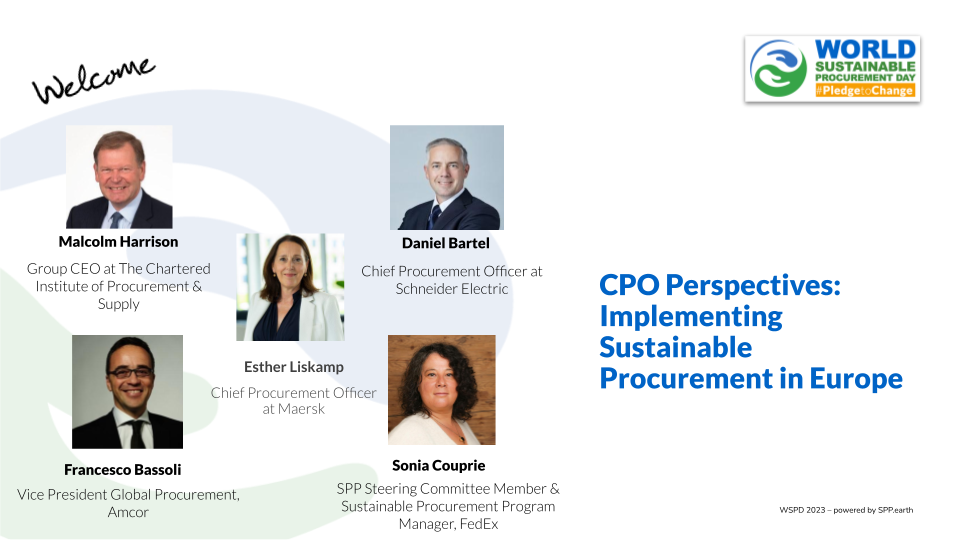WSPD 2023 brought together top CPOs and industry experts from across the globe in a 24-hour-long event, designed to empower and equip Procurement Practitioners with knowledge, best practices, and practical solutions to Sustainable Procurement challenges that need to be tackled NOW.
Broadcasting in 4 different regions, – APAC, AMESA, Europe/UK & the Americas – each session was curated to address the most prominent regional issues surrounding Sustainability in Procurement.
Check out all of the WSPD 2023 sessions here
Kickstarting WSPD 2023 in Europe and the UK, regional CPOs and Thought Leaders;
Daniel W, Bartel (CPO, Schneider Electric)
Francesco Bassoli (Vice President Global Procurement, Amcor)
Malcolm Harrison (Group CEO, CIPS)
And Esther Liskamp (CPO, Maersk)
were invited to participate in the first session of the region ‘CPO Perspectives: Implementing Sustainable Practises in Europe’, moderated by Sonia Couprie (SPP Steering Committee Member & Sustainable Procurement Program Manager, FedEx).
This panel discussion highlighted the challenges, opportunities and priorities facing sustainable procurement practices in Europe. It was an opportunity for the panellists, as experts and practitioners, to share practical insights into what’s important for the region, what key priorities are for CPOs, and how procurement practitioners can take action today, in their own organisations.
Here are the top 4 takeaways from the session:
Procurement is all about Value
The session was kicked off with one of the most frequently asked questions: “how do you push a sustainability agenda while balancing cost-saving?” and each speaker was quick to echo the same sentiment:
“Procurement has always been about value” – Malcolm Harrison
Speaking briefly about the evolution procurement has experienced over the years, Daniel Bartel accounted the development of Procurement’s existing ‘cost-saving’ narrative to the requirement of fulfilling and delivering on a core value of the time. However with the shift in company values and its increasing focus on sustainability, so has the value procurement is charged with delivering.
“Companies that value sustainability are asking their departments to get to work” Daniel commented before mentioning the cost-investment procurement is embarking on with technologies, processes and supplier collaboration efforts to deliver on their organisation’s sustainability strategies.
Malcolm Harrison mirrored this sentiment stating that “sustainability has to be led by the business” and “the choices businesses make today through their supply chain really impacts the entirety of what we [Procurement] do”. He goes on to mention that when everyone from suppliers to investors and decision-makers get involved, it pushes sustainability to the top of everyone’s agenda.
Dare to Walk Away
While discussing values, the panellists continued to return to a concept of ‘non-negotiable’ or ‘basic’ values that companies must hold when striving for sustainability.
Esther Liskamp took this opportunity to reinforce the risks brands can bring to themselves when aligning with suppliers who do not share the same basic/non-negotiable values. She goes on to state that sustainability is no longer an “optional choice” for all organisations, especially for brands with increasing consumer demands to act in a sustainability-forward manner.
According to Esther, companies and their procurement functions are responsible not only for staying compliant with sustainability standards and regulations but also for protecting the brand against unnecessary risks in the process.
“You have to make sure you are making the right choices from an environmental as well as a social and governmental aspect” – Esther Liskamp
Daniel chimed in equally stating that “the reputation of your organisation is huge” and that to achieve your sustainability goals Procurement must “align and all drive in the same direction”, using your non-negotiable values as a measure for which suppliers are best suited to your brand.
Esther then continued to mention something not often heard amongst Procurement Professionals, the ability to walk away: “If something is very much in your price point but it does not support your ambitions, you need to dare to walk away”.
Emphasising that sustainability does not have to be expensive, Esther spoke about how cheap does not mean better, and it is safer to walk away from the cheaper option if it does not align with your basic values rather than placing your brand at a long-term risk by associating with less-reputable suppliers.
Procurement needs to work in unison to achieve sustainability
“You cannot look at sustainability in isolation” – Francesco Bassoli
Procurement has often been known to stand alone, but with the rising importance of sustainability, and the shortening timeline to reduce carbon emissions, it is clear that we must work together.
Francesco Bassoli mentioned the visibility Procurement has and how it can be leveraged to spotlight sustainability agendas into the wider community. According to him, it is crucial to share information about market constraints and allow Procurement’s role of “managing the interface between each company and the supply market” to determine a better future for the organisation as a whole.
Both Daniel and Esther spoke of Procurement working in markets that do not yet exist.
Stating that “we all need to work on this”, Daniel stressed the need for Procurement as a function to work together and increase the demand for sustainable goods, serving to lower overall costs and increasing accessibility. Similarly, Esther mentioned how working with your supplier base allows Procurement to obtain better access to the right tools for achieving your sustainability goals.
Daniel even encourages procurement professionals to use available resources, such as The Sustainable Procurement Pledge to help them learn from each other and achieve sustainability together.
“We are not alone” – Daniel Bartel
Malcolm also resonated with the theme of ‘unity’ amongst Procurement, explaining the confusion suppliers feel when presented with mixed sustainability messages by their various customers.
With strategic suppliers often working with similar organisations, Malcolm noted that by receiving unified and succinct communication from their customer base, suppliers can better focus their efforts and resources on improving their sustainable practices.
When procurement professionals work in unison, they not only improve their own skills but can help their organisations to achieve their sustainability targets, while firmly establishing sustainable actions/values as an industry standard.
Do it Today!
Esther highlighted the dilemma that suppliers who do not know how to measure their carbon emissions, yet want to make a start on sustainability often find themselves in – Focusing on measurement can delay taking action, but taking action is seen as futile without a way to measure your progress.
However, she combated this concern by stating that there is “no such thing as a supplier baseline”. Everyone starts from different points, and will, more often than not, use their consumer bases as a guideline for what they need to deliver. With this, she encouraged everyone to “do stuff today”, stating there is “no need to wait until you have a clear direction or a program in place”.
Malcolm mirrors this, equally stating that not everyone will start in the same place. Instead they “need to start now” and strive for continuous and positive improvement, especially for organisations that are looking to be more sustainable by 2050.
Sonia Couprie summed it up by saying “it is not about being accurate. It’s about making an impact”. Not knowing where you are, should not stop you from making a start!
Check out the full panel discussion below to hear more of the panellist’s key insights about implementing sustainable procurement in Europe and the UK.



